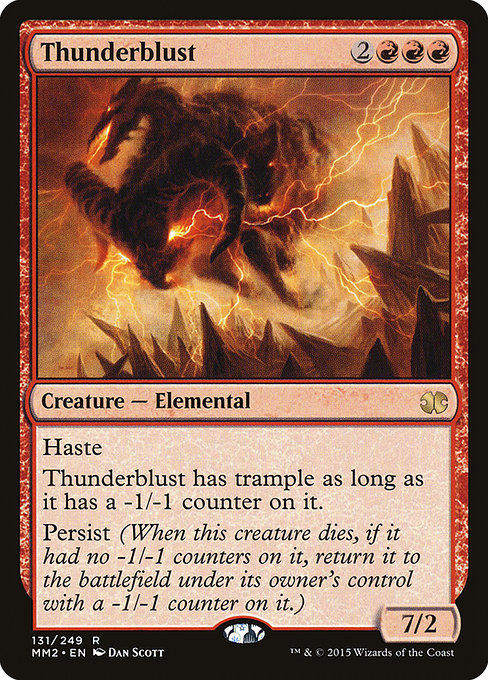
Image courtesy of Scryfall.com
Thunderblust and the Web of MTG Lore: A Visual Map for Red's Roaring Narratives
If you’ve ever built a story around a red elemental on a scorching quest, Thunderblust is the kind of creature you invite to the table for a loud, boisterous conversation. This Modern Masters 2015 rarity—red through and through—offers more than a punchy body and flashy keywords. It’s a catalyst for exploring how MTG’s flavor, mechanics, and history braid together into a cohesive lore-map you can visualize, annotate, and replay on the battlefield 🧙🔥. Let’s map Thunderblust’s relationships across color, design, and story, and see how a single card can illuminate a broader mythos that fans love to chase like sparks from a bonfire ⚔️.
Thunderblust at a Glance: the spark that starts the fire
- Mana cost: {2}{R}{R}{R} — a bold five-mana commitment that signals a late-game hammer with early-game teeth.
- Card type: Creature — Elemental
- Rarity: Rare (MM2, Modern Masters 2015) — a reprint that fans loved for its power and presence.
- Power/Toughness: 7/2 — a formidable early threat that keeps pressure up the curve.
- Keywords: Haste; Persist (with a twist) — and a nuanced edge that redefines how you value its board impact.
- Colors: Red (R) — a color identity that screams chaos, speed, and raw force.
- Set and status: Modern Masters 2015 (MM2) — a set renowned for reprints that celebrate MTG’s design heritage.
Mechanics that bind Thunderblust to red’s broader lore
Thunderblust anchors a classic red archetype: raw aggression tempered by clever recursion. Its Haste ensures it can swing the moment it enters the battlefield, mirroring red’s appetite for tempo and initiative 🧙🔥. But the card doesn’t stop there. When it dies, if it has not yet carried a -1/-1 counter, it reappears with a -1/-1 counter due to its Persist ability. That single line—“Persist (When this creature dies, if it had no -1/-1 counters on it, return it to the battlefield under its owner's control with a -1/-1 counter on it.)”—is a tiny, elegant engine for long-form storytelling on the table. It gives red a surrogate for resilience, a mythic “rebirth” moment that echoes countless in-story flame-beasts across the Multiverse 🧨.
Once Thunderblust returns with a -1/-1 counter, it gains trample—but only while that counter exists. The moment it’s fat with a counter, you unlock a new strategic thread: you can push through damage that would otherwise be blocked, rewarding calculated risk. That dynamic—start with an unstoppable offensive push, then lean into the counter-driven edge—embodies red’s love of high-risk, high-reward plays. It also invites a lore-minded player to imagine Thunderblust as a creature whose very death-and-rebirth cycle mirrors mythic fires that refuse to be extinguished, burning brighter with each renewal 🔥⚔️.
Visualizing the lore network: Thunderblust as hub
Think of Thunderblust as a hub in a constellation map of MTG lore. Its edges reach into several domains:
- Color and theme: Red’s fast tempo, impulsive power, and appetite for risk. Thunderblust embodies that ethos as a massive, aggressive elemental that punishes stalled boards and punishes passivity 🧭.
- Mechanics network: Haste, Persist, and a conditional Trample create a triad of themes. Haste accelerates tempo; Persist introduces a second life, and Trample adds inevitability once you’ve delivered a counter-laden presence. The synergy invites players to design around first- and second-chance damage windows, crafting a narrative where doom is delayed, then delivered with a roar 🎯.
- Set identity: MM2’s Modern Masters reprint culture celebrates historical MTG design. Thunderblust’s rarity and foil options underscore the idea that some lore-beasts are worth preserving across eras—just like a myth told and retold at different tables and in different formats 💎.
- Story implications: The card’s life cycle—dies, returns with a counter, gains trample—lends itself to flavor stories of flame-bound resilience and red-aligned ferocity. Imagine a hearth-guardian of volcanic isles reissuing its fury after every cataclysm, a legend told in the language of counters and consequence 🌋.
“In red, every rebirth is a roar, and every roar leaves a mark—sometimes on the board, often on the memory.” 🧙🔥
Practical visualization tips for players and collectors
- Graph your mana curve: Thunderblust sits at a higher mana threshold, so map its arrival against early game threats. The card rewards a build that can support a late-game punch with a sense of urgency in the early turns 🧭.
- Track counter dynamics: Persist creates a repeating narrative arc. In your deck design, pair Thunderblust with effects that place -1/-1 counters or interact with counters in general to maximize its late-game presence ⚙️.
- Art and flavor as data points: The artwork—dramatic and fiery—tells a story of a beast reborn from its own embers. For lore-minded players, pairing the card text with the art helps visualize Thunderblust’s place in red’s mythic storytelling tapestry 🎨.
- Set context for value discussion: As a rare MM2 reprint, Thunderblust’s foil versions tend to attract collectors. The given price range—foil around a dollar-and-change, non-foil modestly lower—reflects a balance between nostalgia and practical play-worth. For EDH or casual moderns, it’s a spicy upgrade that pays off with big presence on the battlefield 💎.
A cross-promotional note for fans who love tactile accessories
If you’re drafting a table-top experience that blends narrative and play, consider pairing the evoke of fire and resilience with a tactile, neon-friendly desk companion. The product link below points to a neon cyberpunk desk mouse pad that captures the same energy Thunderblust radiates across a battlefield: bold, bright, and ready to push your focus toward victory. The synergy between the imagination of MTG and the tactile joy of a high-contrast desk setup is exactly the kind of cross-promotion that fans celebrate 🎲🎨.